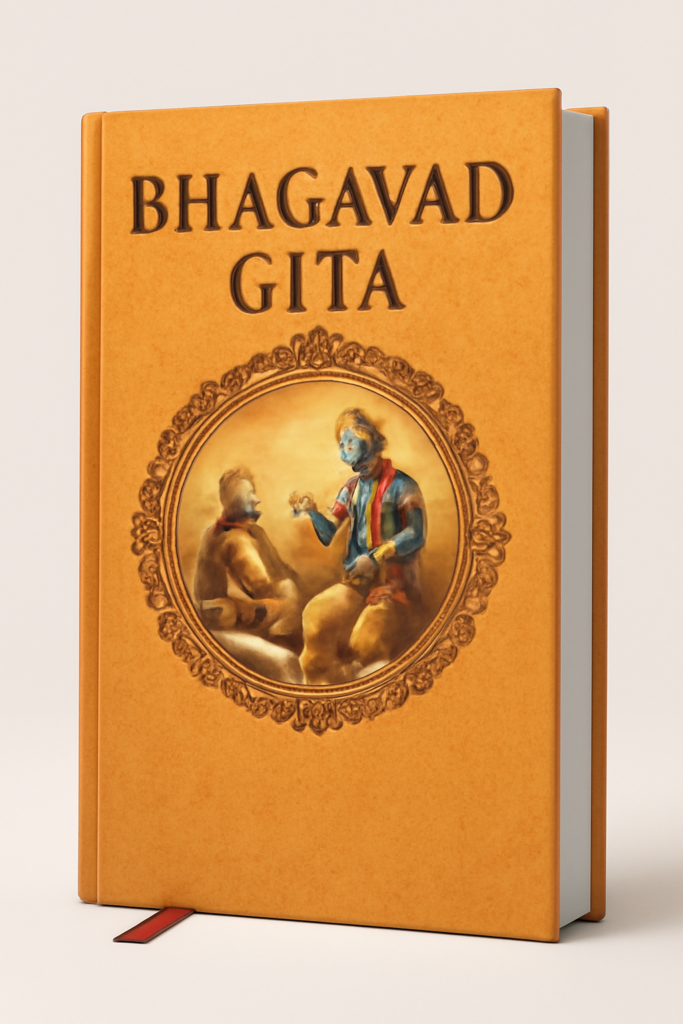India’s spiritual and cultural past is large and rich, closely linked with the concepts of wisdom, enlightenment, and ethical behaviour. On this World Heritage Day, we pause to consider one of the best treasures of Indian society—the Bhagavad Gita. Respected now as a part of our global legacy, this sacred book has moved millions of hearts and brains all around. We stand tall now since the Bhagavad Gita rightly ranks among the most influential philosophical and spiritual masterpieces produced worldwide.
The Bhagavad Gita: An Old Treasure Always Beautiful
More than just a book, the Bhagavad Gita is a dialogue between Lord Krishna and Arjuna illustrating remarkable intellectual insight spanning geography and time. Comprising 700 pages, the Gita addresses the complexities of life, obligation, and spirituality so guiding society along the route of justice. It exhorts people to match their higher objective, go above their own personal challenges, and behave selflessly.
Its lessons appeal everywhere and transcend one church or culture since they promote peace, meditation, and spiritual development. The Bhagavad Gita offers responses to basic questions on the human condition, the purpose of existence, and the nature of the soul. Its celebration on World Heritage Day so honours its continuing impact on human intellect and society.
A glorious occasion for India.
Today we celebrate the Bhagavad Gita’s acknowledgement on World Heritage Day, therefore honouring the preservation and global acceptance of cultural legacies. This awareness highlights the significance of spreading ancient information to the society and of preserving it. The Bhagavad Gita’s outstanding philosophical ideas have inspired not only intellectuals but also everyone searching for inner peace and clarity. This event in Indian history reminds us of our joint obligation to protect and disseminate our spiritual and cultural treasures.
Other Indian Documents of Global Importance
The Bhagavad Gita takes top stage on this World Heritage Day, but India’s spiritual and cultural scene features many other important works. These writings have affected not just India’s spiritual journey but also offered mankind fundamental information. Given their significant contributions, these extra Indian records also deserve respect.
The Riggveda
The oldest text in the world, the Rigveda is the foundation of Indian spirituality. It provides a thorough understanding of early Vedic society and cosmology and music honouring the deities.
The Manusmriti
Often known as the “Laws of Manu,” this ancient book covers morality, justice, and social order. It permeates many elements of Indian law and civilisation.
Forming the pillar of Indian philosophy, the Upanishads reflect the highest level of Vedic knowledge and philosophical writings investigating the nature of life, the self, and the ultimate truth (Brahman).
Arthashastra from Chanakya
Originally written by the ancient Indian thinker Chanakya, the Arthashastra is a treatise on politics, military tactics, economics, and administration. Its ideas are still relevant for examination of statecraft and organisational leadership.
Ramayana from Valmiki
Valmiki’s epic tale the Ramayana follows Lord Rama, his wife Sita, and his fight against the demon king Ravana. Providing teachings on virtue, dharma (responsibility), and loyalty, it is a thread running through India’s cultural fabric that is absolutely vital.
Mahabharate:
Among the longest epics in the world, rich with stories of valour, loyalty, and moral conundrums, the Mahabharata covers the Kurukshetra battle. Part of this epic, the Bhagavad Gita makes the Mahabharata even more indispensable piece of spiritual writing.
Sanskrit Literature and Books
Ancient Sanskrit works, particularly those of poets like Kalidasa, capture the richness of India’s literary tradition. Still much admired for their emotional depth and beauty, Kalidasa’s Shakuntala and Meghaduta
Jain agamas:
Jainism is one of India’s ancient faiths; the Jain Agamas comprise its writings. These texts offer instruction on morality, nonviolent life, and the path to spiritual emancipation.
An Appeal to Save and Share
Celebrating World Heritage Day with the Bhagavad Gita encourages one to really value the significance of preserving our cultural past. Universal knowledge found in these ancient works will guide us towards more awareness, compassion, and understanding. These philosophical and spiritual jewels make us Indians rather proud, hence it is our responsibility to ensure they are passed on to the coming generations.
Our legacy is a beacon guiding us towards a brighter future instead of only reflecting the past. The lessons of the Bhagavad Gita, the Vedas, and other writings still have relevance, peace, and knowledge in the contemporary culture.
On this World Heritage Day, let us recognise and appreciate the Bhagavad Gita and the countless other texts defining India’s intellectual and spiritual history. Not merely remnants of the past, these masterpieces are living, breathing lessons constantly impacting our globe today.
Let us stand courageously bringing these timeless treasures forward as we commemorate the past, modernize the present, and inspire future generations.

Posted inInk & Insight


